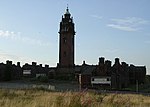Possil Marsh
Protected areas of GlasgowSites of Special Scientific Interest in Dumbarton and North GlasgowUse British English from November 2017

Possil Marsh is a nature reserve and Site of Special Scientific Interest, of both flora and fauna, within the city of Glasgow, Scotland. The reserve was once part of an extensive system of lochs and marshes which extended throughout much of lowland West Central Scotland. However, centuries of drainage and reclamation have resulted in the elimination of much of this system. Due to its geographic position, the marsh is particularly vulnerable from industrial and residential development. The reserve contains a monument for the High Possil meteorite, which fell there in 1804.
Excerpt from the Wikipedia article Possil Marsh (License: CC BY-SA 3.0, Authors, Images).Possil Marsh
Tresta Road, Glasgow Cadder
Geographical coordinates (GPS) Address Website External links Nearby Places Show on map
Geographical coordinates (GPS)
| Latitude | Longitude |
|---|---|
| N 55.90255 ° | E -4.26424 ° |
Address
Possil Marsh Nature Reserve
Tresta Road
G23 5DD Glasgow, Cadder
Scotland, United Kingdom
Open on Google Maps









